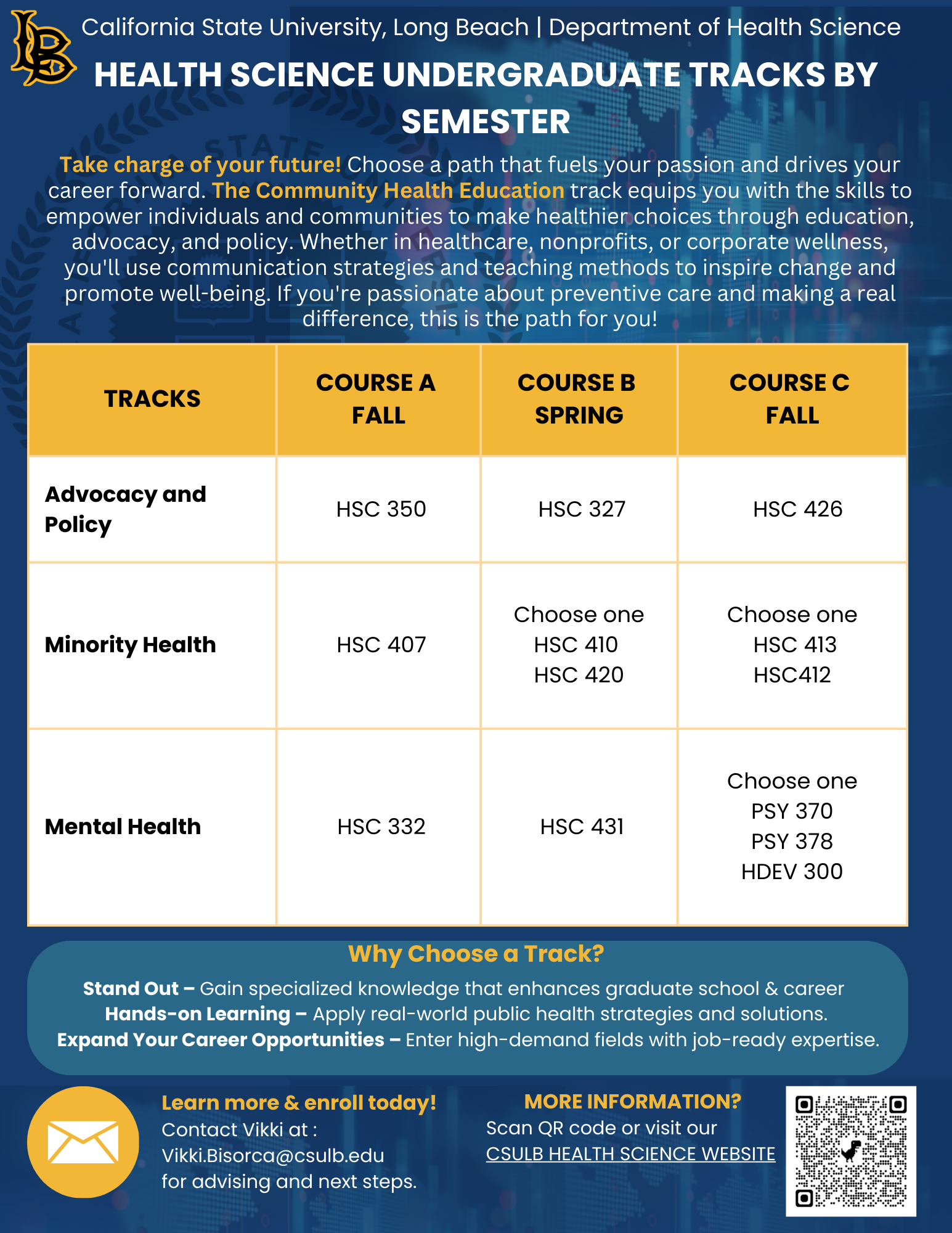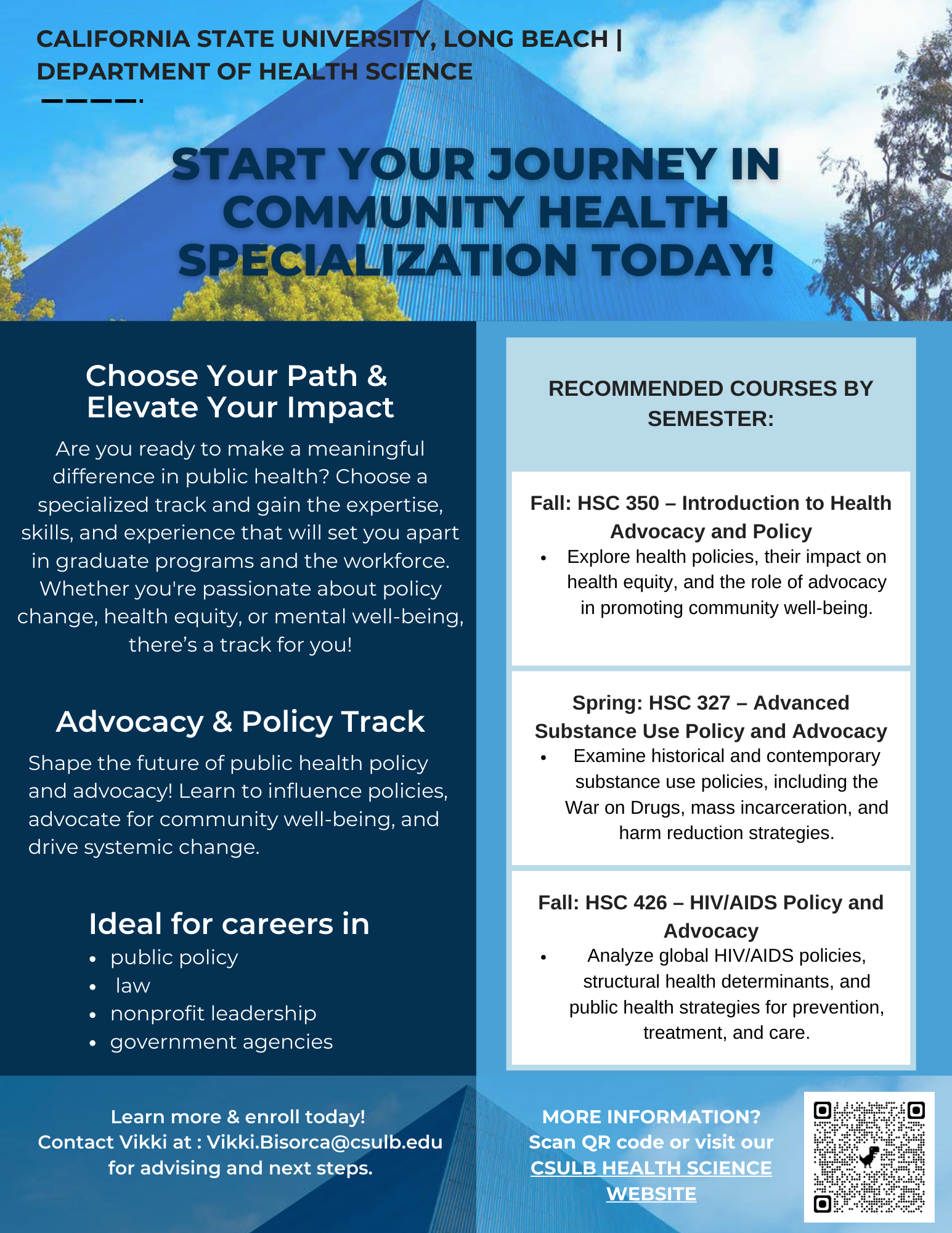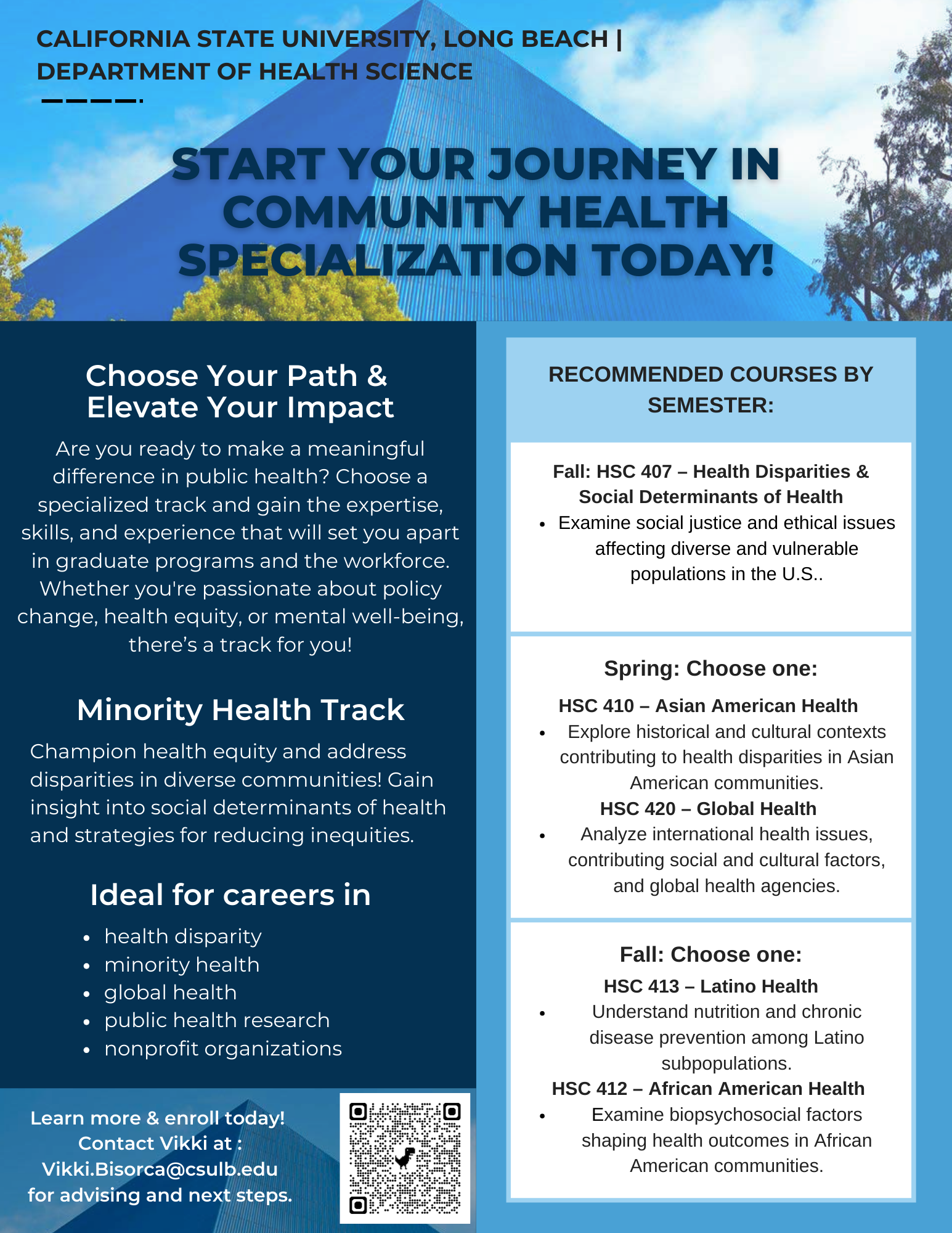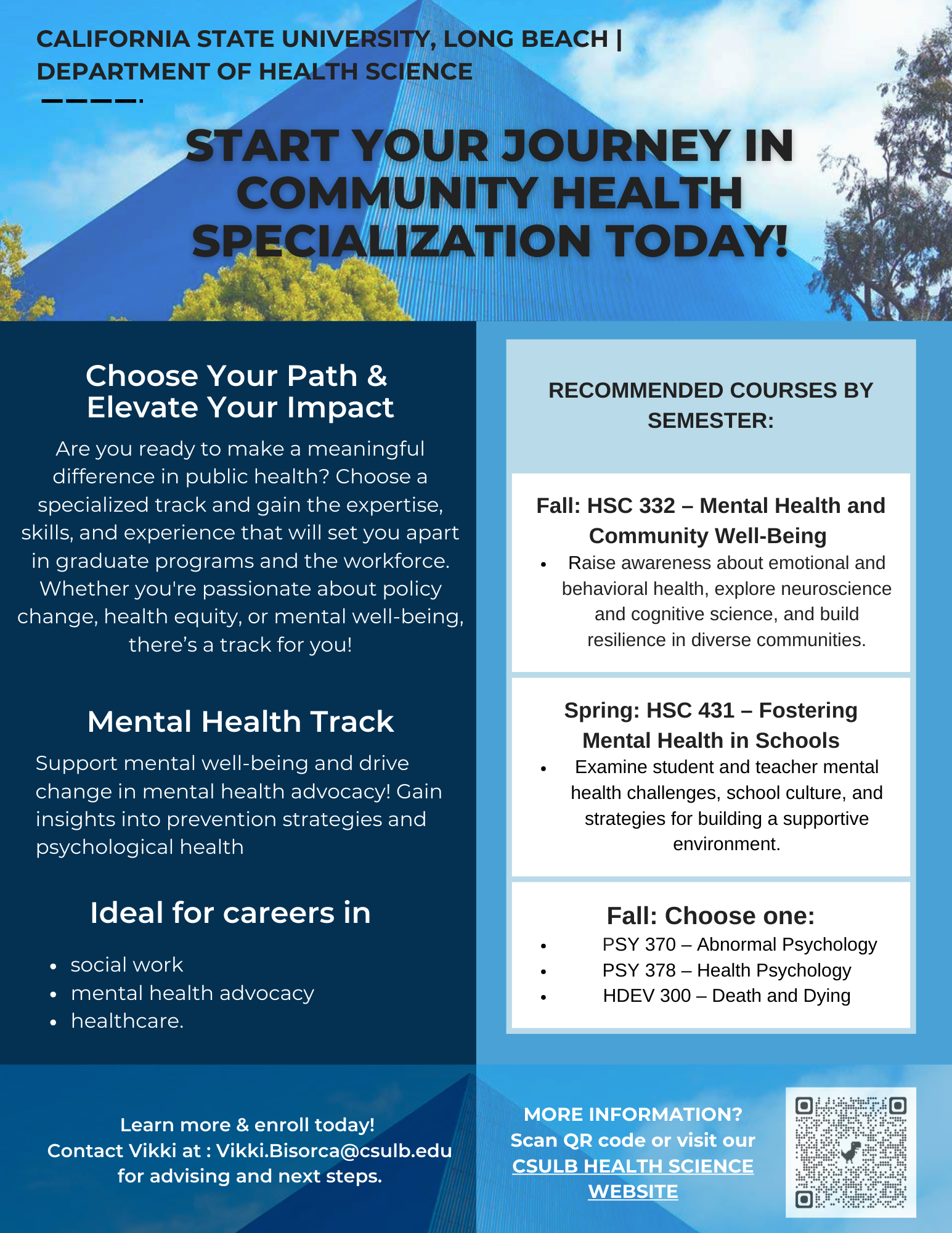Undergraduate Program Options & Courses
Community Health Education
The Community Health Education Option is designed for individuals interested in the links among lifestyle, social and physical environments, and good health. The occupational objective of those selecting this option is to serve as a community health educator in public or private health care agencies, voluntary organizations, medical clinics or corporate settings. Health educators use a variety of communication strategies, policy implementations, teaching methods and creative learning experiences to promote voluntary actions, and informed decisions conducive to health. Health educators are specifically trained to:
- Assess health education needs.
- Provide communication regarding the distribution and determinants of disease and injury.
- Plan, develop, implement, manage and evaluate health education programs
- Participate in social planning, advocacy, and coalition building.

Community Health Program Planners (Requirement Worksheets):
Health Science Community Health Education 24-25.pdf
Health Science Community Health Education 23-24.pdf
Health Science Community Health Education 22-23.pdf
Health Science Community Health Education 21-22.pdf
Community Health Tracks



School Health
The School Health Education Option is designed for individuals who desire to pursue a professional preparation program leading to qualification as a health education teacher in middle, junior, and high schools. Graduates may also pursue other administrative careers within a school district such as health education curriculum coordinator, or a substance abuse prevention coordinator. In addition to core requirements, students seeking this option must also be admitted to the College of Education's Single Subject Credential Program. Students must successfully complete all required coursework and teaching assignments leading to a California Single Subject Teacher Credential.
School Health Program Planners (Requirement Worksheets):
Health Science School Health Education 24-25.pdf
Health Science School Health Education 23-24.pdf
Minor in Health Science
Minor in Health Science (Requirement Worksheets):
Health Science Minor 24-25.pdf
Health Science Minor 23-24.pdf
- 150. Medical Terminology (1)
- Development of medical vocabulary emphasizing the building of terms utilizing prefixes, combining forms and suffixes. Includes medical terms for application in the interpretation of medical records. (Lecture-discussion 1 hour) Letter grade only (A-F)
- 201 - Introduction to Public Health (3)
- Prerequisite: Course that fulfills the A2 GE requirement.
Overview of Public Health including: history; epidemiology of infectious and chronic disease; prevention and control of diseases; social determinants of health; strategies for eliminating disease; health disparities; career opportunities; community organizing and health promotion; environmental health and safety; and healthcare policy at an individual, community, national and global level. - Letter grade only (A-F). Not repeatable for credit.
- Prerequisite: Course that fulfills the A2 GE requirement.
- 210. Personal Health and Wellness (3)
- Prerequisite: Course that fulfills the A2 GE requirement.
- Develop a scientific understanding of contemporary health issues enabling one to examine, interpret, evaluate and apply to individual personal health; includes health related issues experienced throughout the life cycle and an identification of community health resources.
- 227. Drugs and Health (3)
- Prerequisite: Completion of the G.E. Category A.
- Study of psychoactive drugs with primary attention to alcohol, nicotine, caffeine, cannabis, hallucinogens, narcotics and other drugs; examination of trends, philosophical issues and behavioral practices associated with drug use and dependence. Includes physiological psycho-social, legal, historical, philosophical and political aspects; treatment-rehabilitation activities and programs; and drug abuse prevention education.
- Not open for credit to students with credit in H SC 327 or H SC 427.
- 250.Public Health Biology (3)
- Prerequisite:Course that fulfills the A2 GE requirement.
- Introduction to the biological mechanisms of communicable and non-communicable diseases including cellular biology, immunology, and pathophysiology and the intersection with public health epidemiology, global disease burden, treatment, and prevention strategies.
- Letter grade only (A-F). (3 hours lecture)
- 260. Introduction to Public Health Informatics and Technology (3)
- This course introduces the fundamentals of public health informatics and technology. It will cover the basic concepts of public health, including the history and structure of public health in the United States. An overview of public health informatics and data will be explored, and how they support public health.
- 297. Selected Topics in Health Science (3)
- Group investigation of selected topics.
- 301. Orientation to Health Science (3)
- Prerequisite: Open to Health Science majors, pre-majors and minors only. Freshmen excluded.
- Overview of philosophy of Health Science Department Orientation to degree requirements, career opportunities, and theoretical and practical issues of health education as a profession.
- 327. Advanced Substance Use Policy and Advocacy (3)
- Prerequisite: Upper Division Standing
- Examine current and historical landscapes and public policy as they relate to substance use around the world. In the United States, particular attention is paid to the impact of such policies upon vulnerable populations, including the War on Drugs, mass incarceration, and racial justice. Current public health issues include opiate epidemics, harm reduction movement, decriminalization, provision of prevention/treatment services, and bridging gaps in research to inform public policy. Letter grade only (A-F). (Lecture - 3 contact hours) Not repeatable for credit
- 332. Mental Health and Community Wellbeing (3 units)
- Prerequisite: Upper Division Standing
- Raise awareness about mental, emotional, and behavioral health, reduce stigma, provide the latest research on cognitive science, neuroscience, self-care methodologies, emotional regulation and management techniques, prevalent mental disorders and their treatment options. Students will explore research based techniques to empower diverse communities to build resilience. Letter grade only (A-F). Not repeatable for credit.
- 360. Public Health Informatics: The Role of Data (3)
- Prerequisite: H SC 201 or H SC 260.
- Students will gain an understanding and application of public health informatics and technology with a focus on health/healthcare disparities. Students will procure, create, clean, manage, and analyze data to answer public health questions. Health informatics standards will also be introduced.
- 400. Principles of Epidemiology (3)
- Prerequisite: H SC 403.
- Application of epidemiologic procedures to the understanding of the occurrence and control of infectious and chronic diseases, mental illness, environmental health hazards, accidents, and geriatric problems. Letter grade only (A-F). (Lecture 3 hours)
- 401. Community Health Education (3)
- Prerequisite: H SC 301.
- Concepts of community health education with emphasis on community organization; application of these concepts to health education activities of official, voluntary and professional health agencies. Letter grade only (A-F).
- 402. Applied Concepts of Community Health Education (3)
- Prerequisites: H SC 301, H SC 401 and H SC 421
- Identification and application of concepts unique to community health education; includes examination of theoretical foundations, marketing and promotion techniques, and application of health education strategies. Letter grade only (A-F).
- 403. Community Health Statistics (3)
- Prerequisites: GE Math and SOC 250 or PSY 210 (PSY 100 prereq) or STAT 108
- Representative topics are descriptive statistics, sample designs, central tendency, and variability. Statistical tools for inferential analyses include hypothesis testing and parameter estimation. Letter grade only (A-F). (Lecture 2 hours, Activity 2 hours)
- 405. Health Education Program Evaluation and Measurement (3)
- Prerequisites: H SC 403 and H SC 421
- Research designs, standardized measurements, data collection, analysis, and reporting are used to develop evaluation skills to assess program outcomes. Program activities promoting behavior change in communities, organizations, groups, and individuals are evaluated. Letter grade only (A-F). (Discussion 3 hours)
- 407. Health Equity & Social Justice in the US (3)
- Prerequisite: GE Foundation, one or more Exploration courses and upper-division standing.
- Explores social determinants of health associated with health inequities in the U.S. Students will learn about historical and current social justice and ethical issues affecting positive health outcomes and access for diverse and vulnerable populations.
- Letter grade only (A-F).
- 410. Asian American Health (3)
- Prerequisite: Upper Division Standing.
- An exploration of the current health status of Asian Americans and examination of how the historical, structural, and cultural contexts of diverse Asian American communities contribute to health disparities.
- Includes consideration of applications of community-based research principles to improve the health of diverse Asian communities.
- 411A. Health Science for Elementary Teachers (3)
- Prerequisite: Upper-division standing. Corequisite: Current CPR Certification required.
- Contemporary teaching of health education in elementary schools; emphasizes coordinated school health, drugs, sexuality, nutrition, child abuse, violence, community and human ecology. Based upon California Health Framework, it meets state credential requirements. Not open for credit to health Science majors or minors.
- 411B. Health Science for Secondary Teachers (3)
- Prerequisite: Upper-division standing. Corequisite: Current CPR Certification required.
- Contemporary teaching of health education in secondary schools; emphasizes coordinated school health, integrating health content and instruction into other subjects, drugs, sexuality, nutrition, child abuse, violence, community, and human ecology. Based upon the California Health Framework, meets state credential requirements. Not open for credit to health Science majors or minors.
- 412 - African American Health (3)
- Prerequisite: Upper Division Standing.
- This course will explore the historical, societal, and biopsychosocial factors that influence health and well-being among African Americans.
- This course will analyze the roles and identities of African Americans related to perceptions of health, wellness and illness, and culturally tailored self-care practices.
- 413 - Latino Health (3)
- Prerequisite: Upper Division Standing.
- Latino Nutrition, Health and Chronic Disease Prevention will explore nutrition-related and contextual factors associated with the high rates of chronic disease among diverse Latino-specific subpopulations and provide culturally relevant strategies for prevention.
- 420. Global Health (3)
- Prerequisite: GE Foundation, one or more Exploration courses, and upper-division standing.
- Analysis of current health problems in the world; examination of contributing social, psychological, physical, legal and cultural factors; international programs for the improvement of world health; structure and functions of world health agencies and organizations.
- 421. Health Behavior (3)
- Prerequisites: Upper-division standing
- Survey of contemporary research on the health effects of human behavior. Special emphasis is given to current issues of health behavior, decision-making in contemporary society, values clarification and contemporary theories of behavior change (e.g., health belief model). Letter grade only (A-F).
- 422. Environmental Health (3)
- Prerequisite: Upper-division standing
- Examination of the reciprocal relationship existing between man and his environment, with the emphasis directed toward the health related consequences of man's actions in the environment. Letter grade only (A-F).
- 423. Consumer Health (3)
- Prerequisite: Upper-division standing
- Effective selection of health information, products and services; medical quackery and fraudulent health practices; laws and agencies protecting the consumer; health care delivery systems; and influences of corporate control on the consumer movement in contemporary society. Letter grade only (A-F).
- 425. Human Sexuality and Sex Education (3)
- Prerequisite: G.E. Foundation, one or more Exploration courses, and upper-division standing. Recommended: PSY 100.
- Biomedical, sociological, and psychological aspects of human sexuality, the communication of sexual information, the implementation, content and evaluation of family life and sex education in the schools.
- 426 - HIV/AIDS Policy and Advocacy (3)
- Prerequisite: Upper Division Standing.
- Examine history and progress of HIV/AIDS in a global context, with particular emphasis on social and structural determinants of health and how policies, programs, and practices impact communities that experience unequal progress as it relates to HIV. National, regional, and multinational strategies are explored. Global public health topics include: HIV prevention, treatment, access to care, and supportive services.
- 430. School Health Program (3)
- Prerequisite: HSC 301.
- Intensive analysis of the philosophy, organization and legal aspects of the school health program. Includes school and community coordination for a team approach to health education for the school age individual. Letter grade only (A-F).
- 431 - Fostering Mental Health in the School Environment
- Prerequisite: Upper Division Standing.
- Contemporary teaching of mental health issues in children and adolescents ages 5 to 17; explores the various levels of impact on the students, teachers, classroom and school culture; emphasizes prevalent health issues, student and staff mental health and wellness, and strategies for building a mentally supportive school environment.
- 435./535. Health Promotion and Risk Reduction (3)
- Prerequisite: H SC 421.
- Health promotion/risk reduction program content, development and implementation for use in corporate, hospital and public settings. Intended primarily for Health Science majors. Letter grade only (A-F). (Discussion 3 hours)
- 440. Applied Concepts of Health Science (3)
- Prerequisite: A grade of “C” or better in HSC 430. GWAR portfolio course or score of 11 or higher on the GWAR Placement Exam. Health Science majors and minors only. Upper division standing.
- Identification and application of the concepts and modes of inquiry unique to the discipline of health science; development of appropriate curriculum based upon an analysis of individual, school and community needs and interests. Letter grade only (A-F).
- 460A. Emerging Technologies for the Public Health (3)
- Prerequisites: HSC 260 and HSC 360
- This course is designed to introduce students to emerging technologies for public health. As the healthcare ecosystem evolves with massively expanding volumes of data, provider organizations are facing new challenges on how to make sense of the data available. Letter grade only (A-F). Not repeatable for credit.
- 460B. Public Health Maps and Spatial Analysis for Health Equity (3)
- Prerequisites: HSC 260 and HSC 360
- In this course students will acquire geospatial skills applied to health disparities/racial justice. The primary goal of this course is gaining skills to approach public health problems from an equity perspective. The key course learning objective is understanding place in display and analysis of health data at local/national/global scales. Letter grade only (A-F). Not repeatable for credit.
- 485. Internship in Community Health Education (3)
- Prerequisites: H SC 402 and H SC 405
- Preparation for and introduction to work experience in a community health organization. A minimum of 120 hours work experience in a community health organization under direct supervision of a preceptor. Letter grade only (A-F). (6 hours activity)
- 490. Independent Studies in Health Science (1-3)
- Prerequisite: Consent of instructor.
- Students conduct independent library or laboratory research under the supervision of a faculty member and write a report of the investigation. May be repeated to a maximum of 6 units.
- 497. Selected Topics in Health Science (3)
- Group investigation of selected topics. Letter grade only (A-F). May be repeated for a maximum of 6 units with different topics in different semesters.Topics announced in the Schedule of Classes.
- Certificate in Public Health Informatics Worksheet
- For more information visit : Public Health Informatics and Technology Certificate





